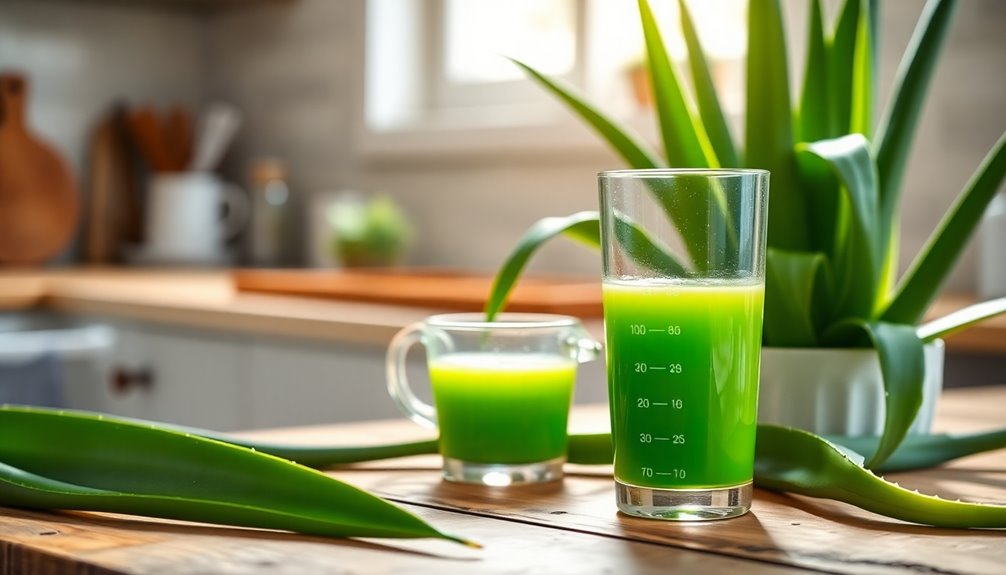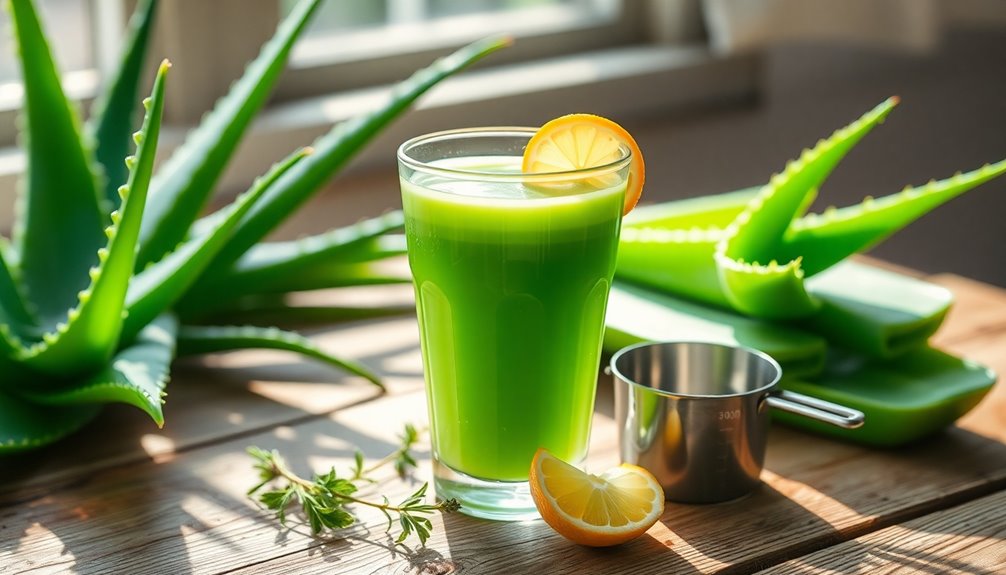To maximize the benefits of aloe vera juice, start with 1-2 ounces (30-60 milliliters) daily. Gradually increase your intake, up to a maximum of 8 ounces per day. Be sure to use the inner fillet form for safety, as whole leaf versions can cause digestive issues. Stay mindful of potential side effects and consult a healthcare provider if you have any concerns. There's more to discover about its benefits and ways to consume it effectively.
Key Takeaways
- Start with a dosage of 1-2 ounces (30-60 milliliters) of aloe vera juice daily for most users.
- Gradually increase the intake, with a maximum of 8 ounces per day.
- Opt for inner fillet aloe vera to avoid gastrointestinal issues associated with whole leaf versions.
- Always check product labels for specific dosage instructions and consult a healthcare provider before starting.
- Monitor for any potential side effects, especially digestive issues, and adjust dosage accordingly.
Recommended Dosage Guidelines

When you’re considering adding aloe vera juice to your routine, starting with a dosage of 1-2 ounces (30-60 milliliters) is typically the best approach for most users. You can gradually increase this amount, but keep in mind that the maximum daily intake is generally around 8 ounces. The type of product you choose matters; inner fillet aloe vera is often safer, while whole leaf versions may cause gastrointestinal issues. Always check the product label for specific instructions. If you’re using concentrated aloe vera juice, you might need to take a smaller dose. Additionally, it’s important to monitor for symptoms of aloe toxicity while consuming aloe vera juice. And remember, it’s wise to consult a healthcare provider before starting any new regimen to address any individual health concerns. In addition to monitoring your intake, it’s essential to follow daily aloe vera juice recommendations to ensure you benefit from its properties without experiencing adverse effects. Some individuals may have specific health conditions that require tailored advice, making it even more crucial to seek guidance from a healthcare professional. By staying informed and cautious, you can enjoy the potential health benefits of aloe vera juice while minimizing any risks associated with its consumption.
Health Benefits of Aloe Vera Juice

Aloe vera juice offers a range of health benefits that can enhance your overall well-being. It supports digestive health by detoxifying your body and cleansing your colon, which helps with normal digestive function. Drinking it can also improve your skin's hydration and reduce acne, giving you a healthier glow. The polysaccharides in aloe vera juice stimulate your immune system, helping to fight off viruses. Additionally, drinking aloe vera juice stimulates bone marrow production, which promotes the creation of red and white blood cells. Packed with vitamins A, C, and E, along with essential minerals, aloe vera boosts your nutritional intake. Furthermore, its antioxidants reduce the risk of conditions like diabetes and heart disease, while providing anti-inflammatory effects beneficial for various health issues. Incorporating aloe vera juice into your routine can lead to a healthier lifestyle.
Types of Aloe Vera Products

While exploring the various types of aloe vera products, you'll discover options tailored to meet specific skin, hair, and wellness needs.
For skin care, consider LÉA NATURE SO BiO étic Organic Aloe Vera & Rose Soothing Micellar Water for sensitive skin or Bioearth Aloe Vera Gel for sun-stressed areas. 99% pure aloe vera gel is ideal for treating irritated skin and can be a great addition to your skincare routine.
If you're focusing on hair, ŌMAKA Naturkosmetik Ō6 Aloe Vera Splash nourishes curly hair, while benecos Natural Basics Sensitive Shampoo is perfect for fine, dry hair.
For general hydration, try Kelly Loves Aloe Vera Drink for a refreshing boost.
If specific skin conditions concern you, LÉA NATURE SO BiO étic Aloe Vera Hypoallergenic Eye Contour Cream soothes reactive skin.
With so many choices, you can easily find the right product for your needs.
Potential Side Effects to Consider

Although many people enjoy the benefits of aloe vera juice, it's essential to be aware of potential side effects that can arise from its use.
Digestive issues like stomach cramps, diarrhea, and vomiting can occur, especially with high doses. You might also face risks like dehydration and electrolyte imbalances, which can harm your kidneys. Aloe vera juice can cause these adverse effects due to its laxative effects and the presence of latex in some formulations.
If you're on medication, aloe vera can interfere with absorption, especially for diabetes and heart medications.
Pregnant or breastfeeding women should avoid it due to potential risks to the uterus or infant.
Additionally, be cautious of skin irritation or allergic reactions.
Always consult a healthcare professional if you have concerns about how aloe vera might affect you.
Tips for Preparation and Consumption

When preparing and consuming aloe vera juice, it's important to follow a few simple steps to maximize its benefits.
Start by washing and peeling the aloe vera leaf to extract the gel, then blend it with water and lemon juice. Strain the mixture to remove any pulp, adding sweeteners or flavorings if desired. Aloe vera juice is typically low in calories, making it a healthy addition to your diet.
Use gloves to avoid skin irritation and skip the yellow latex, as it can cause discomfort. For daily consumption, start with 1-2 ounces, gradually increasing to 8 ounces based on your tolerance.
Enjoy it on an empty stomach for optimal absorption, and consider mixing it with fruit juices or smoothies for better taste.
Store any leftovers in the refrigerator and consume within a few days.
Frequently Asked Questions
Can Children Safely Consume Aloe Vera Juice?
No, children shouldn't safely consume aloe vera juice. Aloe latex and whole-leaf extracts aren't safe for kids under 12 due to potential side effects like stomach pain and diarrhea.
You should consult a pediatrician before considering any form of aloe for your child. While aloe gel may be used topically for skin issues, oral consumption carries risks that outweigh any unproven benefits.
Always prioritize safety and expert advice when it comes to children's health.
Is Aloe Vera Juice Safe During Pregnancy?
Aloe vera juice isn't considered safe during pregnancy due to potential risks.
It can stimulate uterine contractions, which might lead to miscarriage, and it may cause electrolyte imbalances.
If you're pregnant, it's best to avoid aloe vera juice altogether. Instead, focus on safe alternatives for hydration and nutrition.
Always consult your healthcare provider before trying any new supplements or remedies during this important time in your life. Your health and safety come first!
How Long Does It Take to See Benefits?
When you start drinking aloe vera juice, you might notice some benefits within just a few days, especially for digestive issues.
However, improvements in skin health could take longer, often requiring consistent use over several weeks.
For blood sugar regulation, regular consumption is crucial, and significant effects may take time to appear.
Staying consistent with your intake will help you maximize the potential benefits you're looking for.
Can Aloe Vera Juice Expire or Go Bad?
Yes, aloe vera juice can expire or go bad.
If you've opened a bottle, you should consume it within a few weeks to maintain freshness. Store it in the fridge to extend its shelf life.
Unopened juice typically lasts 1 to 3 years if kept in a cool, dry place.
Always check for changes in color, smell, or texture, as these signs indicate spoilage and that you shouldn't consume it.
What's the Best Time to Drink Aloe Vera Juice?
Picture yourself as a health guru, sipping aloe vera juice like it's the elixir of life!
The best time to drink this magical potion is in the morning. It clears toxins and kickstarts digestion, setting a positive tone for the day.
If you're feeling fancy, try consuming it before meals to tackle heartburn. Just remember, an empty stomach mightn't appreciate this green goodness, so find the timing that suits you best!
Conclusion
Incorporating aloe vera juice into your daily routine can be a game-changer for your health. Did you know that just 2 to 4 ounces a day may boost your digestion and hydration significantly? That's like sipping a refreshing wellness elixir every morning! Just remember to choose quality products and listen to your body. With the right dosage, you can enjoy the many benefits of aloe vera while keeping potential side effects at bay. Cheers to your health!
Susannah expertise lies in researching and compiling evidence-based content on juicing, nutrition, and overall health. She is committed to ensuring that The Juicery World offers accurate, up-to-date, and trustworthy information to empower readers to take control of their health. Susannah’s goal is to inspire individuals to embrace juicing as a way to nourish their bodies and live their best lives.











